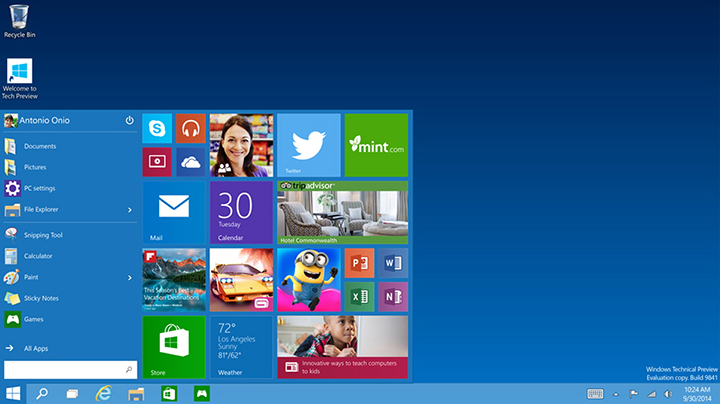TORONTO – Microsoft’s Windows 10 operating system will be available to users this summer, the software giant announced Wednesday.

The next version of the flagship operating system will be available to users in 190 countries in 111 languages, Microsoft’s Terry Myerson announced in a blog post.
Windows 10 will be a pivotal launch for Microsoft. The latest version of the operating system, Windows 8, was widely shunned by users who were thrown off by the software’s radical changes.
Microsoft – which skipped the name “Windows 9” altogether – has promised Windows 10 will bring back some of the traditional features users loved, like the Start menu that was missing from version 8.
Is Microsoft trying to kill the password?
Microsoft also unveiled a new security-focused feature Tuesday dubbed Windows Hello – a biometric security system that will allow users to sign into Windows 10 devices using their fingerprints, eyes and even faces.
“We want your devices to recognize you, to understand what you’re saying… we want the experience to go wherever you do and we want you to feel a great sense of trust as you go,” read a blog post by Microsoft’s Joe Belfiore.
“You– uniquely you– plus your device are the keys to your Windows experience, apps, data and even websites and services – not a random assortment of letters and numbers that are easily forgotten, hacked, or written down and pinned to a bulletin board.”
Microsoft argues that biometrics are more secure than traditional passwords.

Get daily National news
Experts agree that many users will find biometrics easier than remembering passwords and provide more secure entry to devices – however, biometrics aren’t perfect and have been tricked before.
READ MORE: Your voice could become your banking password on your smartphone
Windows Hello will use infrared technology to authenticate your identity, via facial or iris detection.
Microsoft said its software cannot be fooled by photographs.
For its part, the company said it will use “enterprise-grade” security to protect user’s biometric information. Windows 10 will store biometric signatures on the computer – not on Microsoft servers.
Internet Explorer isn’t dead… yet
Windows 10 will also come with a new web browser, which is known under the codename “Project Spartan.” The browser will feature many new features including voice search through Cortana, the company’s voice assistant.
Over the last week many reports have declared Microsoft’s long standing web browser Internet Explorer – lovingly known as IE – as dead, after the company confirmed it was ditching the IE name for its new browser.
“We’re now researching what the new brand, or the new name, for our browser should be in Windows 10,” Microsoft’s marketing chief Chris Capossela said Tuesday during a Microsoft Convergence speech.
“We’ll continue to have Internet Explorer, but we’ll also have a new browser called Project Spartan, which is codenamed Project Spartan. We have to name the thing.”
But IE isn’t dead just yet.
Microsoft has confirmed that IE will still be available for customers who require legacy browsing support. So even though Windows 10 will feature Microsoft’s shiny new web browser, IE will still be around for now.
Free upgrade to users running Windows 7, 8
In a break from past practice, Microsoft announced that Windows 10 will be released later this year as a free upgrade for anyone owning a computer or gadget that’s currently running Windows 8.1 or 7, the two previous versions of the software.
Microsoft has not announced a release date beyond “summer 2015.”








Comments
Want to discuss? Please read our Commenting Policy first.